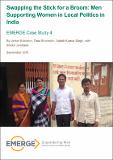| dc.contributor.author | Edström, Jerker | |
| dc.contributor.author | Shahrokh, Thea | |
| dc.contributor.author | Kumar Singh, Satish | |
| dc.contributor.author | Jamdade, Shakti | |
| dc.coverage.spatial | India | en |
| dc.date.accessioned | 2015-09-16T12:35:51Z | |
| dc.date.available | 2015-09-16T12:35:51Z | |
| dc.date.issued | 2015-09-16 | |
| dc.identifier.citation | Edström, J., Shahrokh, T., Kumar Singh, S., with Jamdade, S. (2015) ‘Swapping the Stick for a Broom: Men Supporting women in Local Politics in India’, EMERGE Case Study, Promundo-US, Sonke Gender Justice and the Institute of Development Studies | en |
| dc.identifier.isbn | 978 1 78118 267 3 | |
| dc.identifier.uri | https://opendocs.ids.ac.uk/opendocs/handle/20.500.12413/7058 | |
| dc.description.abstract | Women’s engagement, leadership and decision-making in the public sphere continues to be suppressed in much of rural India. It is controlled by cultural norms which place women as subordinate to men, and prescribe their roles as confined to the domestic sphere. . Understanding and supporting women’s pathways of empowerment within and between private and public life continues to be a feminist struggle for women’s rights and gender equality. This paper shares findings of case study research exploring how work with men can contribute to this process of change, and support women’s participation in public and political life. The work of the Samajhdar Jodidar (meaning ‘understanding partner’) project in rural Maharashtra, provides an interesting, and important example of the role men can play in contributing to progressive social change on women’s public participation.
Research with 42 men and women involved in this initiative, either directly as activists or as key stakeholders, including women local government representatives, provides some important lessons for how this kind of approach can work. Importantly the commitment to democratic accountability on gender equality spans both private and public spheres. Men first work through consciousness raising to transform their own practices within their homes and intimate relationships. This provides a platform for social action in the wider community and enables trusting relationships to be built with women to work together to drive political change. Demanding accountability from existing legal mechanisms for affirmative action on women’s participation and transforming local level institutions from within have been important strategic areas. | en |
| dc.language.iso | en | en |
| dc.publisher | Promundo-US, Sonke Gender Justice and the Institute of Development Studies | en |
| dc.relation.ispartofseries | EMERGE Case Study; | |
| dc.rights | You are free to:
Share — copy and redistribute the material in any medium or format
Adapt — remix, transform, and build upon the material
For any purpose, even commercially. The licensor cannot revoke these freedoms as long as you follow these license terms.
License terms: You must give appropriate credit, provide a link to the license, and indicate if changes were made. You may do so in any reasonable manner, but not in any way that suggests the licensor endorses you or your use. | en |
| dc.rights.uri | http://www.ids.ac.uk/files/dmfile/IDSOpenDocsStandardTermsOfUse.pdf | en |
| dc.subject | Gender | en |
| dc.title | Swapping the Stick for a Broom: Men Supporting Women in Local Politics in India | en |
| dc.type | Series paper (non-IDS) | en |
| dc.rights.holder | Institute of Development Studies, Promundo-US and Sonke Gender Justice | en |
| dc.identifier.team | Gender and Sexuality | en |

